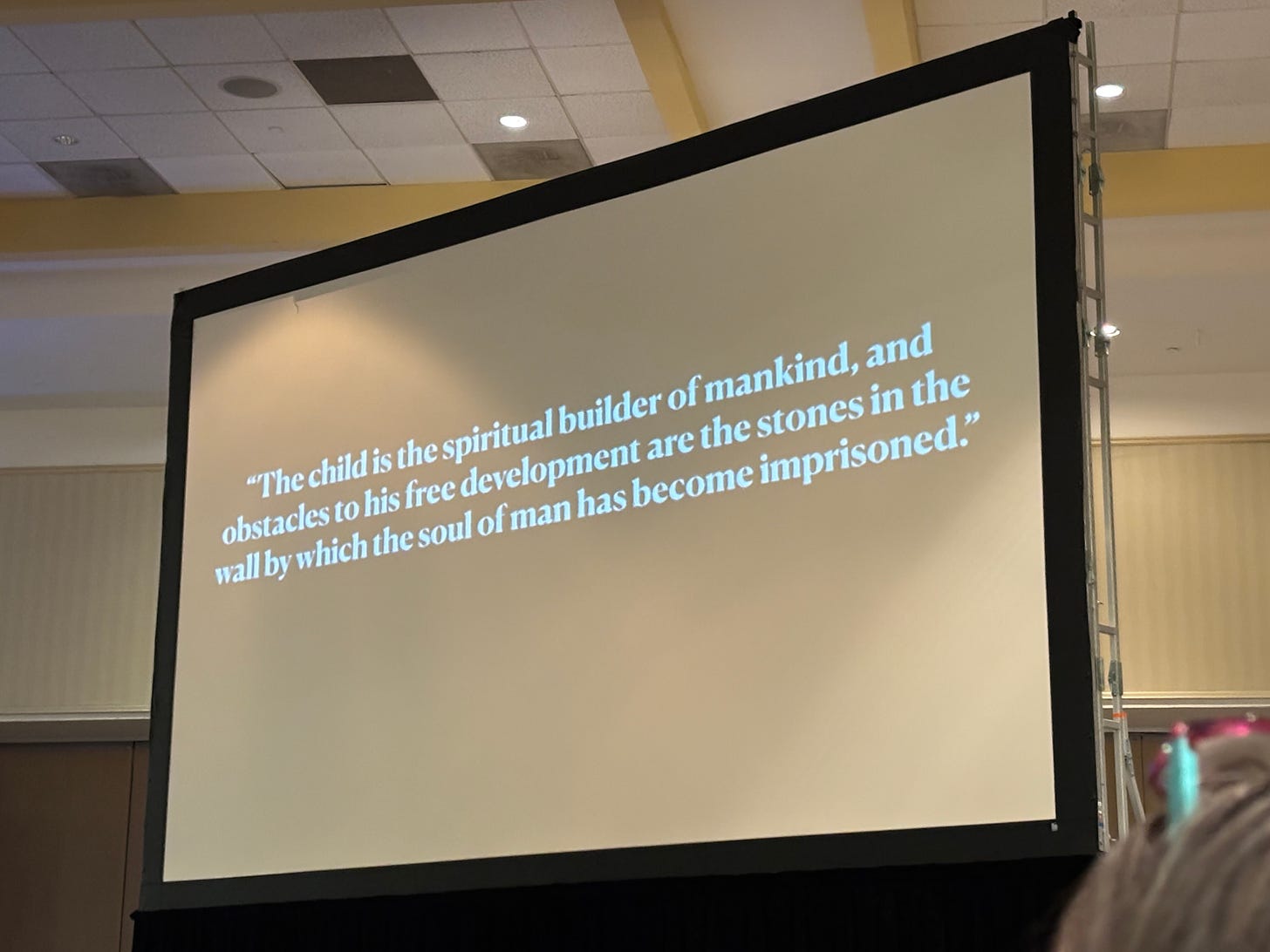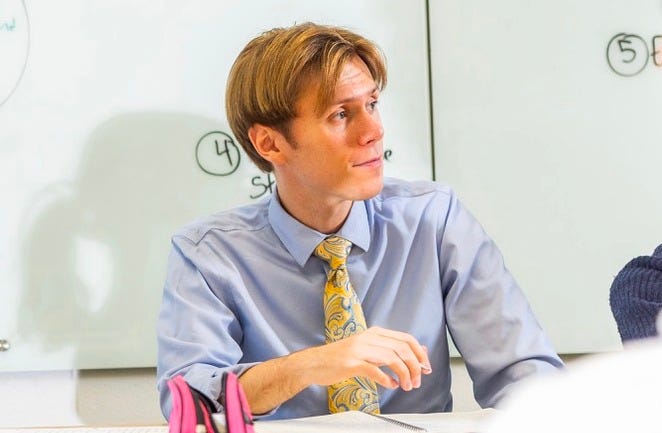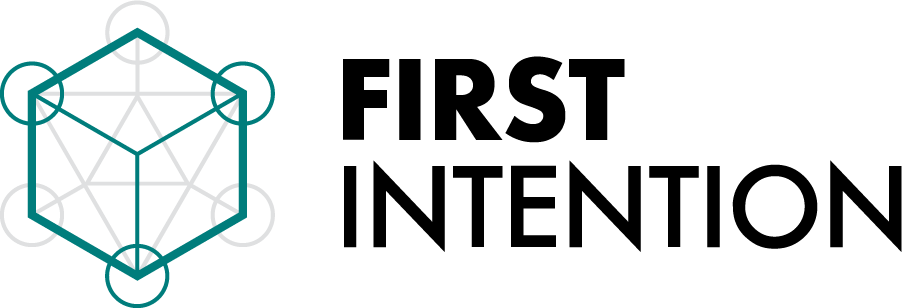The Invitation
Education innovators, leaders, teachers, and thinkers: Let’s co-construct a Syllabus for Humanity!
Ever since I heard
’s keynote address at the International Montessori Council Peace Academy Conference, I have been very excited about the possibility of co-constructing a Syllabus for Humanity: an evolving document which can serve as a guiding light for education as a tool for fundamental transformation of our world.I have already had quite a few people reach out to me, excited to engage in this adventure. In this time of great uncertainty, a Syllabus for Humanity may chart a way forward.
And, this Syllabus for Humanity cannot be developed by one- or a few- of us. We must all be engaged in this work. I will be setting up some Zoom calls this winter (probably in January or February) to get a working group together toward a framing of such a living document.
In the meantime, I’m inviting all of you (yes, all of you!) to contribute to this work by adding ideas to this collaborative Padlet, linked at the end of this post.
If you’re curious, read on, get in touch, and add your ideas to our Padlet. This is a moment not to be missed!
The Provocation: Components of the Syllabus
As I briefly alluded to in my last post, a Syllabus for Humanity is about the dispositions that we as human beings can hold which allow us to exist in interdependence with the human and more-than-human world. This is in sharp contrast to a typical syllabus which is a list of consequences for not following a particular set of rules.
This Syllabus for Humanity needs to be a big tent, allowing for the full range of human diversity while also speaking true to what makes us human and the common threads that connect us to each other.
This project must provoke the keys needed to restructure our ways of being on a global scale to realize the global interdependencies we are already a part of.
Here are some ideas for components of the Syllabus for Humanity.
This is just the beginning of the conversation and requires your input as practitioners, thinkers, leaders, and humans out in the world!
Core Principles for How We Learn and Live:
We cannot make someone change. Rather, we can prepare an environment where the greatest likelihood of positive human flourishing is possible
Sam discussed this idea at the end of his keynote. Much of our education is designed to change children, to mold them into neat boxes that are easy to control and predict.
We must contend that such a system is dehumanizing at its core. Rather than seeking to change ourselves and our young people, we must create environments where individuals will be inspired to transform. We must consider the garden metaphor, that all we can do is prepare the soil, plant the seeds, and water our plants diligently. Ultimately, we cannot control how the plant grows.
Learning must be an active process of action and reflection
How many of us spent years of our lives sitting in rows, diligently following the directions of the adult at the front of the room?
This was the majority of my high school education. If you were to ask me to recall anything I learned in those classes, I would not be able to come up with very much. There was rarely action, nor reflection, only repeating what I had been told well enough to please the adult authority. While some teachers broke the mold occasionally, learning as an active process was the exception, not the rule.
Whether we are working with the youngest of children or the oldest of adults, we must ensure that all have access to learning as a process of action and reflection. Through these experiences of action and reflection, we form our identities and personalities, which is why this type of learning is the greatest gift we can give any human being.
Education must be an aid to life, not an aid to future schooling
This one is coming straight from Montessori, yet even though her work has been around for over 100 years, this is still a difficult concept to instill.
How many young people are pushed through college only to graduate and have no sense or purpose, drive, or intrinsic motivation? They got to the end of the rat race only to realize that the “stakes” were all artificial to begin with.
There’s more to be said here, but I will leave it at this for now.
Values of a Diverse, Equitable, Interdependent World
We must take seriously, and uphold, the United Nations Universal Declaration of Human Rights as a starting point in this work
We have global crises around the world that are in blatant disregard to the UN Declaration of Human Rights. While this document is imperfect, true implementation by all countries, particularly the United States, would make a tremendous difference in creating an equitable, interdependent world.
Here is the link if you haven’t read the declaration in a while: https://www.ohchr.org/sites/default/files/UDHR/Documents/UDHR_Translations/eng.pdf
Folks who are familiar with the scholarship on rights-based education, what should be included here? What should we be considering?
What’s Important to Know?
We must reject the idea that the purpose of education is content acquisition.
However, it is still important to ask the question about what’s important to know. The purpose is not to create an ED Hirsh-style “cultural literacy” list, but to brainstorm parameters and considerations as about what young people “should” learn, and what our general society “should” know.
The Prepared Environment
Based on our human development, what are prepared environments for human flourishing across all ages?
Montessori made parameters for prepared environments for young people from birth through higher education, though the latter is only theoretical.
What if we turned our lens of “prepared environments” to our broader society at large: What types of prepared environments allow people, across different spaces, places, cultures, etc, be able to flourish?
The Ameliorated World, Now
In Montessori education, we see the child as the one who will lead us into a world not yet born.
I agree with that idea- and yet, we cannot surrender our responsibility to children to make the world a better place.
If we believe that an ameliorated world is possible, that living in equitable interdependence with the human and more-than-human world is possible, then we must find ways to live it and model it today for our young people.
We know that we may not be the ones to make the groundbreaking change, however we are thinking seven generations ahead and must be prepared to make the uncomfortable changes now in order to push for the world we know is possible.
So… Are You Provoked?
This is just the beginning- add your ideas to the Padlet and reach out to me if you want to be included in our Zoom calls this winter!
Padlet link: https://padlet.com/andrewfaulstich1/syllabus_for_humanity
Special Announcement!
I just published my first ebook, Every Child is a Wellspring: Designing Student-Centered Learning for Empowerment, Self-Direction, and Autonomy
It’s written for those I’ve met who want to implement the ideas I discuss on this Substack but don’t know how to start.
This book provides a tested framework to develop an emerging curriculum with your students, around their needs, meeting them at the “just right” level of challenge.
In Every Student is a Wellspring, you’ll learn:
How understanding human development can transform your teaching.
A framework to create student-centered curriculum which meets the needs of your students and responds to external standards you may have to teach.
How to create systems in your classroom that run themselves, allowing your students to own the learning process from start to finish.
This ebook is for you if you are an educator or administrator who:
Wants all your students to be deeply engaged in meaningful learning.
Is seeking a framework to design student-centered curriculum.
Is ready to shed traditional education and truly serve each student in your care.
Begin the journey of transforming your curriculum and pedagogy and download a copy today!
Breaking the Paradigm is a division of Developing Education, which is on a mission to transform education globally to foster human development and flourishing for all people.
First Intention: Curriculum and pedagogy support for Montessori adolescent practitioners, specifically with math and language across the prepared environment.
The Enlightened Educator Project: Supporting educators with mindfulness and resiliency through professional development and downloadable resources.









